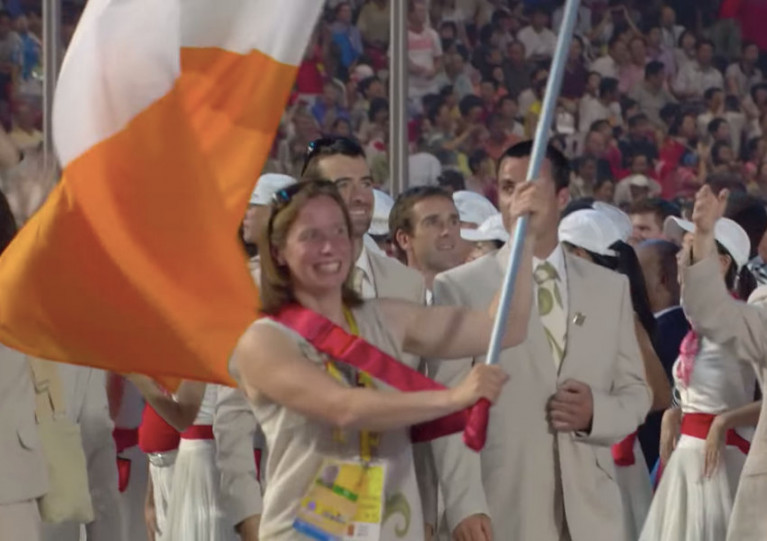Today is the day athletes from around the world would have been celebrating the start of the Tokyo 2020 Olympics at the opening ceremony, writes Gail McAllister.
In many ways it marks the culmination of lifelong dreams, for 2020 the dream is postponed for a year.
So let’s reflect and rewind the clock to this day in 2008, when Olympic Laser Radial sailor Ciara Peelo from Malahide stepped out into the Bird’s Nest, Beijing’s National Stadium, as the flag bearer for the entire Irish Olympic team.
470 sailors Ger Owens and Phil Lawton walked alongside Star sailors Peter O’Leary and Steve Milne, giving Ciara encouragement to “keep on waving that flag” as the thousands of spectators and millions of viewers across the world roared their support.
Today is the day to reminisce with Ciara on her memories of the day.
“Sheer total happiness,” Ciara said. “There was such a happy and enthusiastic atmosphere in the team as we walked into the stadium and the noise was brilliant as we entered the arena of 91,000 spectators, and athletes of all shapes and sizes from the four corners of the world.”
Just look at the smile on Ciara's face; it sums up pride, achievement and happiness…
How did it feel to be chosen to carry the flag?
I got called to a meeting at the Olympic Federation offices in Howth and I thought I was meeting the performance director, James O’Callaghan. They asked if I was willing to take the flag at the opening ceremony. It was a huge honour and surprise to be asked, so of course, the answer was yes.
Sonia O’Sullivan carried the flag and she was my idol growing up, so to have the opportunity to follow in the footsteps of my sporting hero was incredible.
Do you reflect back on the Beijing Olympics?
Yes and no. I went to the Olympics to perform in sailing and I came home feeling like I had not achieved my personal goals. The opportunity only comes around once in every four years and if you don’t achieve in that one event you will naturally be disappointed and are left with a feeling of unfinished business.
I now look back and reflect more positively on the experience. I remember the incredible journey up to and during the event and the milestones along the way.
Have you learnt anything from that emotion?
Yes. Acceptance. I approach and do things very differently now. The journey is as important as the final event. It is hard to see this when you are in the thick of competition. I learnt it was important for me to be happy with what I am doing in life as a whole and I make decisions based on happiness and contentment.
You now work as a teacher. Do you share your outlook and learnings?
I work on teaching the person and teaching the subject becomes part of that. Making sure that the person is learning what they need to learn in a way that works for them is important.
As you know, there is now a High Performance Centre in Dun Laoghaire. Do you look at the facilities that are available now for Olympic campaigners and compare to what you had available?
Everything has progressed and improved on a continuous basis. Post-Beijing a coach was brought in for the Radials and the squad was set up. There has been so much progression across the whole programme from where we were 12 years ago. As you would expect.
James, as performance director, is always looking to do the next thing to be successful. He knew Irish sailing needed squads, coaches and the right set up working with the team and he made it happen. We can all see that the performance speaks for itself.
What additional professional support did you have in 2008?
We had Sports Med Ireland, sports psychology and a nutritionist in the 2008 cycle. These were important and they are now integrated in the programme from Academy level. The athletes get more face time now with support team professionals which is a great step forward but clearly places a demand on resource.
Any advice for young athletes out there?
Choose your goal, your passion. If you want it, then go out and do it. You will feel a better person.
In conversation with Gail McAllister































































